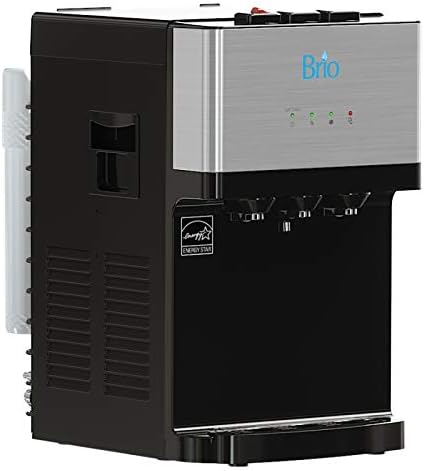Currently Empty: 0.00$
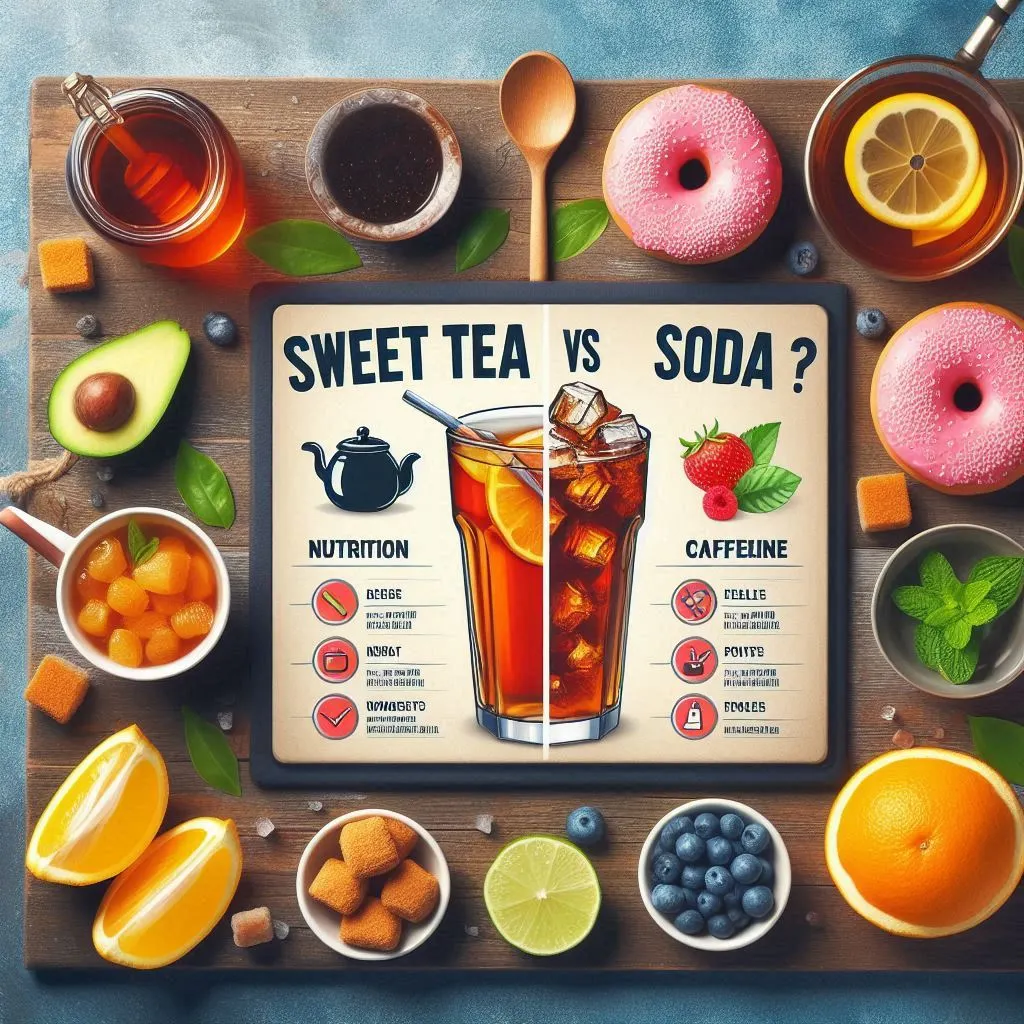
Many people wonder which is the healthier choice when comparing sweet tea to soda. Both drinks are popular and provide refreshing sweetness, but they have different nutritional profiles, ingredients, and health effects.
This article explores whether sweet tea is a better alternative to soda by examining its nutritional content, health impacts, and other factors to help you make an informed decision.
Nutritional Comparison
It’s crucial to examine sweet tea’s calorie and sugar content to determine if it’s healthier than soda.
- Sweet Tea: A typical glass of sweet tea contains around 90–120 calories and 22–32 grams of sugar, depending on how it’s made and the amount of sugar added. Store-bought varieties might contain even more sugar and preservatives.
- Soda: On average, a can of soda (12 oz) contains about 140–150 calories and 35–40 grams of sugar, often coming from high fructose corn syrup (HFCS), a cheaper and more processed sweetener.
Both drinks have high-calorie content, especially if consumed regularly. While sweet tea often contains slightly fewer calories than soda, the difference may not be significant enough to call one healthier based solely on calories. However, sweet tea can be made at home with less sugar, offering more control over the calorie content.
Health Impact
Excessive sugar consumption has been linked to a variety of health issues, including obesity, type 2 diabetes, and heart disease. When comparing the effects of sugar in sweet tea and soda, it’s essential to recognise that both contribute to these risks if consumed in large amounts.
- Sweet Tea: Contains natural sugars from the tea leaves and added sugar. Some versions of sweet tea also include added preservatives, which may affect health over time.
- Soda: Soda, especially those sweetened with HFCS, has been directly linked to obesity and metabolic disorders. Additionally, sodas often contain phosphoric acid, which may negatively affect bone health and lead to a higher risk of kidney problems.
Both drinks can contribute to poor health outcomes. Still, soda’s combination of high sugar, artificial sweeteners, and acidic ingredients often makes it a less desirable choice for those concerned about long-term health.
Sweet Tea Ingredients vs. Soda Ingredients
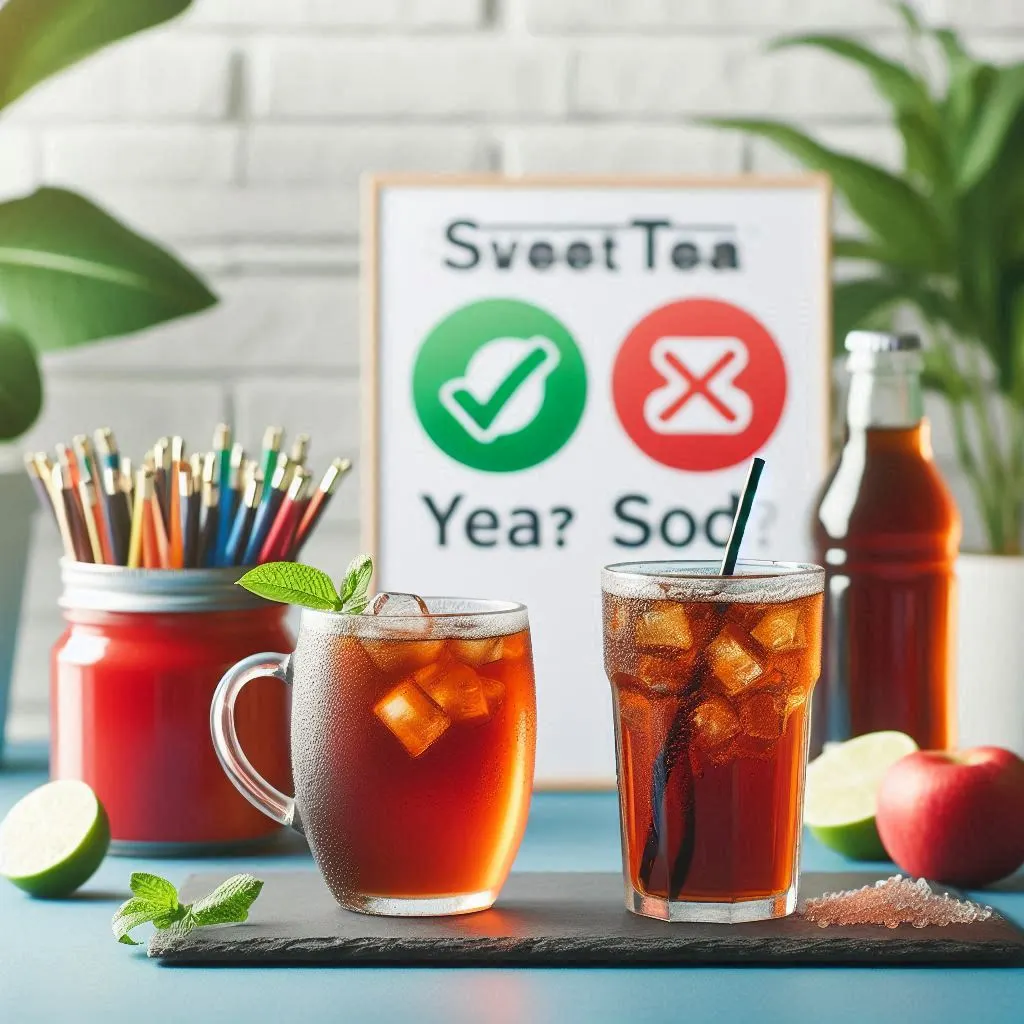
A critical difference between sweet tea and soda is the types of ingredients used in each.
- Sweet Tea: Generally consists of brewed tea leaves, water, and sugar. Homemade versions can be made with natural sweeteners like honey or reduced sugar content, allowing for a healthier alternative. Tea leaves also contain beneficial compounds like polyphenols, which have antioxidant properties.
- Soda: It contains carbonated water, artificial flavouring, preservatives, and either sugar or HFCS. Many sodas are made with artificial colourings, which have been shown to potentially have negative health effects. Some sodas also contain caffeine and sodium benzoate, which can contribute to a range of health issues.
Due to its more straightforward ingredient list, sweet tea can be a healthier option, especially when homemade with natural ingredients.
Hydration Benefits
Both sweet tea and soda contain water, but they are different when it comes to hydration.
- Sweet Tea: Tea, in general, has been shown to offer hydration benefits. While adding sugar reduces its effectiveness as a hydration drink, it’s still better than soda, especially if consumed in moderation.
- Soda: Soda is not considered a good source of hydration. The caffeine and sugar content in many sodas can lead to dehydration, especially if consumed in excess. Diet sodas also contain artificial sweeteners, which can negatively impact hydration.
Sweet tea is a better choice for hydration, mainly if you control the sugar content.
Read more: Can You Drink Soda with Braces?
Caffeine Content
Both sweet tea and soda can contain caffeine, but the levels vary greatly depending on the type and brand.
- Sweet Tea: A typical glass of sweet tea contains about 20–50 mg of caffeine, depending on the type of tea used (black tea tends to have more caffeine than green tea).
- Soda: A soda like cola typically contains 30–40 mg of caffeine, though sodas like Mountain Dew may have higher levels.
Both drinks can boost caffeine, but sweet tea generally contains a slightly more moderate amount. If you’re trying to reduce your caffeine intake, choosing sweet tea made with a lower-caffeine tea, like green tea, could be a better option.
Effects on Weight
Regularly consuming sugar-laden beverages like sweet tea and soda can lead to weight gain.
- Sweet Tea: While sweet tea may have slightly fewer calories than soda, it can still contribute to weight gain if consumed in large quantities. However, the flexibility to control the sugar levels in homemade sweet tea provides an opportunity for weight management.
- Soda: Sodas are infamous for contributing to obesity, mainly due to the combination of high calories, sugar, and lack of nutritional value. Regular consumption of soda has been directly linked to weight gain and metabolic diseases.
If you’re concerned about managing your weight, reducing sugar in sweet tea or using unsweetened tea can make it a better choice than soda.
Dental Health Concerns
Sweet tea and soda can harm dental health in different ways.
- Sweet Tea: The sugar in sweet tea feeds bacteria in the mouth, which produce acid that erodes tooth enamel. However, sweet tea generally lacks the high acidity of soda, making it slightly less harmful to teeth.
- Soda: Sodas, especially those with acidic ingredients like phosphoric and citric acid, can quickly wear down tooth enamel. The combination of sugar and acid makes soda particularly damaging to dental health.
While both drinks pose risks to your teeth, soda is often worse due to its higher acidity and sugar content.
Sweet Tea vs. Soda for Kids
Parents may wonder whether sweet tea or soda is better for their children.
- Sweet Tea: Sweet tea contains sugar, which can lead to health issues similar to those caused by soda if consumed frequently. However, homemade versions can be tailored to contain less sugar, making it a more controlled option for kids.
- Soda: Soda is not recommended for children due to its high sugar content, caffeine, and artificial additives. The consumption of soda has been linked to childhood obesity, type 2 diabetes, and poor dental health.
For parents looking for a better alternative, unsweetened or lightly sweetened tea can be healthier than soda for children.
Energy Levels and Fatigue
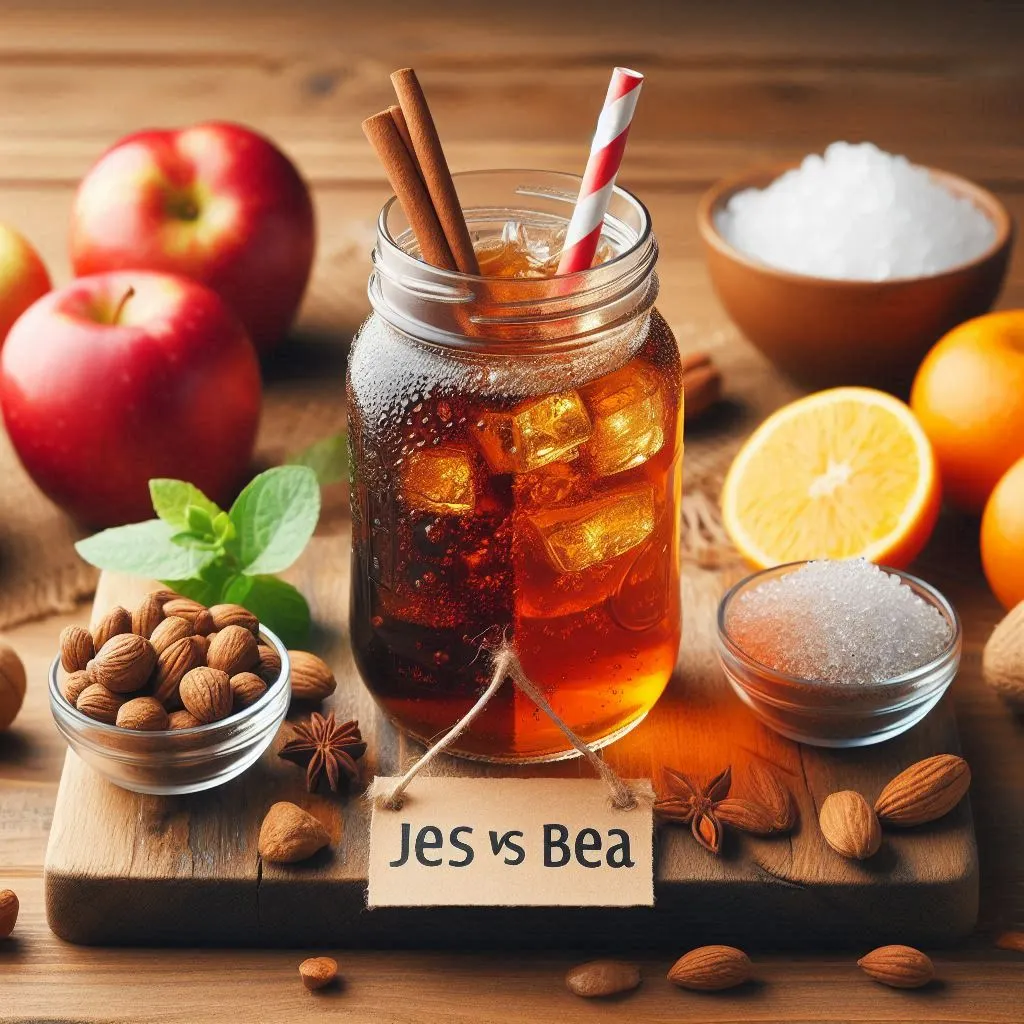
How do sweet tea and soda impact energy and potential crashes?
- Sweet Tea Provides a moderate energy boost due to caffeine and sugar, but the natural caffeine content in tea is less likely to cause the drastic energy spikes and crashes that soda may cause.
- Soda: The combination of sugar and caffeine in soda can cause an immediate energy surge, but this is often followed by a sharp drop in energy, leading to fatigue.
Sweet tea is often a better option than soda for more stable energy levels, mainly if consumed in moderation.
The Role of Antioxidants
One of the most significant benefits of sweet tea over soda is its antioxidant content.
- Sweet Tea: Made from tea leaves, which contain polyphenols—antioxidants that can help protect cells from damage, reduce inflammation, and support heart health. Green tea is particularly rich in antioxidants.
- Soda: Soda offers no health benefits in terms of antioxidants or nutrients. Its ingredients can contribute to oxidative stress rather than reduce it.
If you’re looking for health benefits beyond hydration, sweet tea—especially unsweetened varieties—outshines soda with its antioxidant properties.
Sweet Tea as a Soda Replacement
Is switching from soda to sweet tea a healthier move?
- Sweet Tea Provides a more natural alternative with fewer artificial ingredients. Making sweet tea at home allows control over sugar levels, making it a more flexible option for those looking to cut back on processed sugar and artificial additives.
- Soda: Regular soda consumption is linked to numerous health issues, and there is little to no room for adjusting its sugar or ingredient content.
Sweet tea can be a better alternative to soda for those seeking a healthier option, especially when prepared with minimal sugar and natural sweeteners.
Homemade Sweet Tea vs. Commercial Sweet Tea
There’s a significant difference between homemade sweet tea and the commercial versions sold in stores.
- Homemade Sweet Tea: Offers complete control over the ingredients, allowing for adjustments in sugar content, choice of tea, and sweeteners. You can also avoid preservatives and artificial flavourings.
- Commercial Sweet Tea Often contains high sugar levels, artificial flavours, and preservatives. These additives often diminish the health benefits of tea.
For the healthiest option, homemade sweet tea is recommended over store-bought varieties.
Don’t miss: How Much Does a Soda Machine Cost?
Environmental and Ethical Considerations
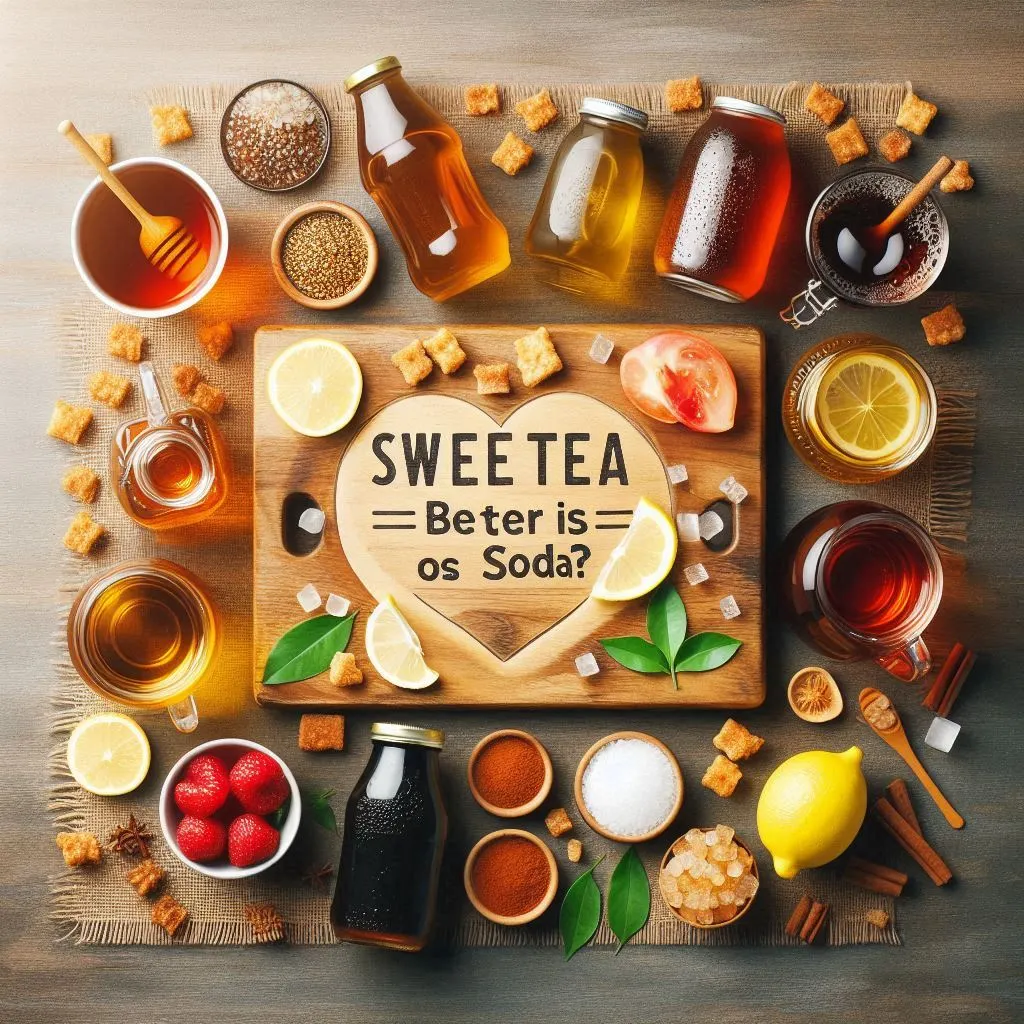
The environmental impact of producing sweet tea and soda differs significantly.
- Sweet Tea: Tea is a natural product, and if sourced from ethical tea plantations, it can have a relatively low environmental impact. Choosing organic and fair-trade tea can support sustainable farming practices.
- Soda: The production of soda involves more industrial processes, including the use of plastic bottles and cans, contributing to higher levels of waste. Additionally, soda production often uses a large amount of water and energy.
Sweet tea is the more sustainable option for environmentally-conscious people, especially homemade.
Frequently Asked Questions (FAQs)
Is sweet tea less harmful than soda?
Yes, sweet tea typically has fewer artificial ingredients and less sugar than soda, making it a healthier option when consumed in moderation.
Can sweet tea help with weight loss?
Sweet tea can be part of a weight loss plan if consumed in moderation and made with little to no added sugar.
Does sweet tea have more caffeine than soda?
It depends on the type of tea used, but sweet tea usually contains less caffeine than most sodas, especially when made with green or herbal tea.
Is it okay to drink sweet tea every day?
Drinking sweet tea daily is fine in moderation, especially if you control the sugar content. However, too much sugar, even from tea, can contribute to health issues.
Is soda or sweet tea worse for your teeth?
Soda is generally worse for dental health due to its high acidity and sugar content, which can erode tooth enamel.
What is the healthiest version of sweet tea?
The healthiest version is unsweetened or lightly sweetened tea made from natural leaves without artificial additives.
Conclusion
In the debate of whether sweet tea is better than soda, sweet tea is the healthier option in most cases, mainly when made at home with reduced sugar. Soda’s high sugar content, artificial ingredients, and health risks make it a less favourable choice. However, both drinks should be consumed in moderation to avoid adverse health impacts.

